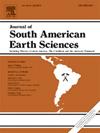Hydrological regime shifts driven by climate and anthropogenic interference in the Upper Paraná River Basin, Brazil
IF 1.5
4区 地球科学
Q3 GEOSCIENCES, MULTIDISCIPLINARY
引用次数: 0
Abstract
Climate change coupled with land-use dynamics drives hydrological alterations, posing risks to water quality and sustainable water resource management. Understanding hydrological responses is key to analyzing the interplay between hydrometeorological processes, yet capturing spatiotemporal variability within basins remains challenging without an integrated assessment addressing interconnected dynamics and change points from climatic and human influences. This study developed a framework combining hydrology model, mutation test, and hydrological sensitivity analysis to evaluate this interplay in Upper Paraná River Basin, Brazil, from 1980 to 2020. The results indicated a general downward trend in the monthly average annual runoff and precipitation in the last decade. The hydrological mutation analysis identified obvious shifts in around 1999 and 2008. The results show a significant temporal shift in the drivers of runoff. Climate change dominated between 1980 and 1998, explaining approximately two-thirds of the total variation. The impact of climate change decreased by 23 % between 1999 and 2007 due to increased human activities such as reservoir construction and land-use change. From 2008 to 2020, continued precipitation reductions and anthropogenic interference led to a more complex hydrological response. Implementing targeted measures, such as regulating reservoir operations and optimizing irrigation system, offers viable pathways for ensuring the sustainable management and utilization of water resources.
巴西上帕拉纳河流域气候和人为干扰驱动的水文状态变化
气候变化加上土地利用动态驱动水文变化,对水质和可持续水资源管理构成风险。了解水文响应是分析水文气象过程之间相互作用的关键,然而,如果没有针对气候和人类影响的相互关联动态和变化点的综合评估,捕获流域内的时空变异仍然具有挑战性。本研究建立了一个结合水文模型、突变试验和水文敏感性分析的框架,以评估1980 - 2020年巴西上帕拉纳河流域的这种相互作用。结果表明,近10年径流和年平均降水量总体呈下降趋势。水文突变分析发现,1999年和2008年前后发生了明显的变化。结果表明,径流驱动因素存在明显的时间变化。1980年至1998年期间,气候变化占主导地位,约占总变化的三分之二。由于水库建设和土地利用变化等人类活动的增加,气候变化的影响在1999年至2007年期间减少了23%。从2008年到2020年,降水持续减少和人为干扰导致水文响应更加复杂。实施有针对性的措施,如调节水库运行和优化灌溉系统,为确保水资源的可持续管理和利用提供了可行的途径。
本文章由计算机程序翻译,如有差异,请以英文原文为准。
求助全文
约1分钟内获得全文
求助全文
来源期刊

Journal of South American Earth Sciences
地学-地球科学综合
CiteScore
3.70
自引率
22.20%
发文量
364
审稿时长
6-12 weeks
期刊介绍:
Papers must have a regional appeal and should present work of more than local significance. Research papers dealing with the regional geology of South American cratons and mobile belts, within the following research fields:
-Economic geology, metallogenesis and hydrocarbon genesis and reservoirs.
-Geophysics, geochemistry, volcanology, igneous and metamorphic petrology.
-Tectonics, neo- and seismotectonics and geodynamic modeling.
-Geomorphology, geological hazards, environmental geology, climate change in America and Antarctica, and soil research.
-Stratigraphy, sedimentology, structure and basin evolution.
-Paleontology, paleoecology, paleoclimatology and Quaternary geology.
New developments in already established regional projects and new initiatives dealing with the geology of the continent will be summarized and presented on a regular basis. Short notes, discussions, book reviews and conference and workshop reports will also be included when relevant.
 求助内容:
求助内容: 应助结果提醒方式:
应助结果提醒方式:


